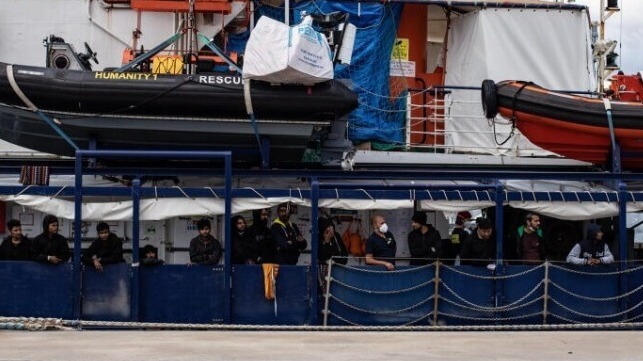Italy Blocks Male Migrants From Disembarking Rescue Ships

Italy's right-wing government is testing a new approach to NGO rescue vessels, which embark maritime migrants in the Central Mediterranean and deliver them to safety in Lampedusa and Sicily. Instead of opening or closing ports altogether, Italian officials are hand-selecting migrants who will be allowed to enter - leaving behind hundreds on board, all adult men, according to rescue vessel operators.
NGO rescue vessels account for a relatively small percentage of Italy's migrant arrivals, but they are symbolic of a critical question in Italian politics: whether to assist or exclude the 50-100,000 people who arrive by sea each year. Newly elected Prime Minister Giorgia Meloni staked out a clear anti-immigration position on the campaign trail. She has previously suggested that the authorities should "repatriate migrants back to their countries and then sink the boats that rescued them," and in recent interviews she has said that migrant flows should be "managed" to ensure border security.
Under Meloni's new minister of the interior, Matteo Piantedosi, NGO rescue vessels are being put to the test. Four applied for entry to ports in Sicily last week and received no reply. On Sunday, the new administration appeared to relent: In a decree, Piantedosi allowed select vessels to enter, but only long enough to assist survivors in "emergency conditions and in precarious health."
On Sunday and Monday, port officials allowed one vessel into Reggio Calabria and two more into Catania. On arrival, medical officers boarded and hand-selected "vulnerable" people for disembarkation.
Based on NGO accounts, the people selected for entry included all women and all children - leaving behind only adult men. 215 men remain aboard the rescue ship Geo Barents and another 35 on the Humanity 1.
The Humanity 1 was instructed to leave port with the remaining rescuees still aboard, according to operator SOS Humanity. The vessel's master refused to depart, claiming a "duty to complete the rescue of people in distress by disembarking all survivors." SOS Humanity says that it will appeal Piantedosi's decree at a tribunal in Rome.
MSF, the operator of Geo Barents, issued a similar statement. "A rescue operation can only be considered complete once all survivors have disembarked to safety," said MSF. "The partial and selective disembarkation, as suggested in the decree of the Italian government, is appalling; it cannot be considered legal under maritime conventions."

that matters most
Get the latest maritime news delivered to your inbox daily.
If the selection process represents permanent policy, it would exclude a substantial share of migrants. 75 percent of all sea arrivals in Italy are adult men, according to UNHCR, followed by children (19 percent) and a small minority of women (six percent).
For its part, Meloni's administration claims that the flag states of rescue vessels (in this case, Norway and Germany) should take responsibility for disembarking rescuees. SOLAS requires masters to deliver rescuees to a port of safety, but it does not specify a role for the flag administration.
